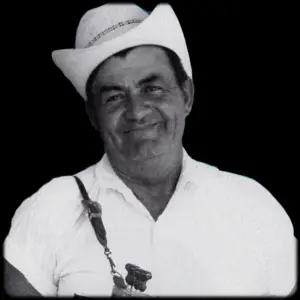 Zydeco and Cajun music are very closely linked: with the mélange of Blues, folk, French and country influences in common, and the shared feel for good-time dance music, the distinction is largely down to the skin-colour of the player. Nathan Abshire was a Creole speaking Cajun accordionist whose local reputation in the 30s was given wider exposure by his records after WWII, and spread the word even further in the 70s with Festival and TV appearances. With a passionate voice and a vast repertoire of Cajun tunes, Nathan could make a dead man dance with his infectious music.
Zydeco and Cajun music are very closely linked: with the mélange of Blues, folk, French and country influences in common, and the shared feel for good-time dance music, the distinction is largely down to the skin-colour of the player. Nathan Abshire was a Creole speaking Cajun accordionist whose local reputation in the 30s was given wider exposure by his records after WWII, and spread the word even further in the 70s with Festival and TV appearances. With a passionate voice and a vast repertoire of Cajun tunes, Nathan could make a dead man dance with his infectious music.
Nathan was born in Gueydan LA in 1913 and by the time he was 8 years old, he was playing his accordion in public, and he became a local favourite at dances and parties. In the 30s he played with Amédé Arduin, a man whose importance to Cajun music is the equal of
Robert Johnson‘s in the Blues, and Nathan picked up some invaluable skills and experience. Despite his growing maturity as a singer and player, he could not make a living from music, and Nathan moved to Basile LA, where he became superintendent of the town dump, a position he held for the rest of his life. He made some recordings for the Bluebird label backed by The Rainbow Ramblers in 1936, but it wasn’t until he returned from service in WWII that his records began to sell well. His ‘Pine Grove Blues’ was a regional hit in 1949 and became his signature tune. Nathan recorded some fantastic virtuoso playing during the 50s and 60s, often in the company of The Balfa Brothers, but Cajun music was still largely a regional novelty.
This clip from the film “J’Etais Au Bal” features Nathan;
That changed in the 70s, partly due to the rise of
Clifton Chenier, ‘The King of Zydeco’, but also down to a PBS documentary film called ‘Good Times Are Killing Me’, which starred Nathan. He had been getting some college and Festival gigs, but after the TV exposure, Cajun went national. As well as playing more schools and colleges, Nathan recorded two well received albums for the Swallow label, and appeared in more interviews and films. Life was finally becoming a little easier, but Nathan’s long struggle with alcohol was catching up with him, and he passed away in his home town in 1981.
 Zydeco and Cajun music are very closely linked: with the mélange of Blues, folk, French and country influences in common, and the shared feel for good-time dance music, the distinction is largely down to the skin-colour of the player. Nathan Abshire was a Creole speaking Cajun accordionist whose local reputation in the 30s was given wider exposure by his records after WWII, and spread the word even further in the 70s with Festival and TV appearances. With a passionate voice and a vast repertoire of Cajun tunes, Nathan could make a dead man dance with his infectious music.
Zydeco and Cajun music are very closely linked: with the mélange of Blues, folk, French and country influences in common, and the shared feel for good-time dance music, the distinction is largely down to the skin-colour of the player. Nathan Abshire was a Creole speaking Cajun accordionist whose local reputation in the 30s was given wider exposure by his records after WWII, and spread the word even further in the 70s with Festival and TV appearances. With a passionate voice and a vast repertoire of Cajun tunes, Nathan could make a dead man dance with his infectious music.